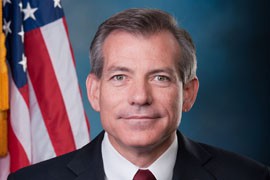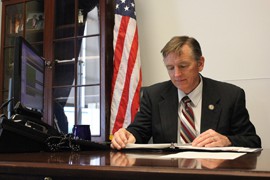Cronkite News has moved to a new home at cronkitenews.azpbs.org. Use this site to search archives from 2011 to May 2015. You can search the new site for current stories.
Tweet, delete, repeat: Politicians turn a microscope into a megaphone
WASHINGTON – The website Politwoops launched this week as a way to catch politicians with their pants down, by cataloguing and posting deleted Twitter tweets of congressmen, the president and presidential hopefuls.
But instead of being embarrassed by the site, politicians within a day had devised a way to gleefully moon the system.
By Thursday morning, Rep. David Schweikert, R-Scottsdale, posted – then quickly deleted – “#politwoops saves lost tweets, now if we can just get President Obama to save lost jobs…” and “Wish #politwoops would hold Obama and Holder accountable for their missing facts on #FastandFurious just as it does missing tweets.”
“He’s found a way to draw more attention not just to social media but to Obama’s failed economic policies,” said Rachel Semmel, a Schweikert spokeswoman. “He wants people to see Obama’s failure to create more jobs. He wants to draw attention to that.”
At least one other elected official is also “posting” deletions aimed at Politwoops. Rep. Danny Rehberg, R-Mont., had intentionally deleted tweets Thursday, like “Scary thought: Many of the same pols that messed up 140 characters on #politwoops also wrote and voted for the 2,300-page Obamacare law.”
The group behind the site, the Sunlight Foundation, didn’t intend for the site to be used that way, but said they’re cool with it if it adds to the public discourse.
“It creates a re-use and it’s not something we expected,” said Gabriela Schneider, the foundation’s communications director. “But Politwoops gives you a bigger, more accurate context to what they’re saying elsewhere.”
As of Friday morning, Politwoops had archived more than 3,000 status updates that politicians had deleted from Twitter, noting when they were deleted and how long the up-to-140-character messages were online.
Some of the deleted tweets appear to involve typos, missing or broken links and other mistakes, including the “Vw” and “T” pocket-tweets deleted by Rep. Ben Quayle, R-Phoenix. Some appear to be from politicians whose accounts were hacked and who deleted the “drop 20 pounds of fat in one week” tweets that went out under their names.
Others changed the wording but kept the message.
Sen. John McCain, R-Ariz., deleted “Dear Vlad, Surprise! Surprise! You won. The people of #Russia are crying too,” in reference to Russian President Vladimir Putin’s election. But it was merely replaced by “Dear Vlad, Surprise! Surprise! You won. The #Russian people are crying too.”
The Sunlight Foundation touted that transparency, along with the ability to see a side of public officials not often seen, Schneider said.
“It’s being able to hold our government officials accountable on this new medium,” she said. “But it’s not just about an ‘aha! gotcha!’ moment. It’s to reveal a little more of an intimate side of them, to see how they engage with their constituents.”
It’s also a reminder that what happens on Twitter doesn’t stay on Twitter, and won’t go away. Schweikert’s office embraces that permanence.
“Anyone who uses Twitter knows it’s open to all the public. That’s not going to scare David off. David knows as soon as he tweets it’s in the public sphere,” Semmel said. “If someone sees a misspelling, then so be it.”
Revealing a congressman’s mistakes may actually improve his image, said a spokeswoman for Rep. Paul Gosar, R-Flagstaff.
“Constituents understand that their congressmen are human and will make mistakes,” Apryl Marie Fogel said. “It adds something to the fact that politicians are not perfect, and we really use social media so that they can be humanized.”
Fogel said the chance to connect directly with the public outweighs misspellings or typos that may show up on Politwoops. She calls social media “one of the most effective ways to get communication out.”
“The media tends to be a little biased, so they don’t really highlight some of the successful things (Gosar) does,” she said. “So this way, people get to see his perspective.”
Schweikert has also used social media to highlight his personal life, using the hashtag #CharlietakesDC to showcase his dog’s adventures around the nation’s capital.








